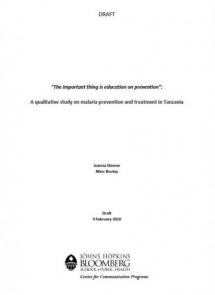A Qualitative Study on Malaria Prevention and Treatment in Tanzania
This report describes research conducted using Focus Group Discussion (FGD) and decision-tree modeling methodology to elicit opinions, perceptions and attitudes about insecticide treated net (ITN) use, treatment seeking behavior for fever, and intermittent preventative treatment for pregnant women (IPTp). The research was part of the background information used to design messages for the Wazazi Nipendeni campaign which was launched in 2012.
Source: Johns Hopkins University Center for Communication Programs, Tanzania Ministry of Health and Social Welfare Reproductive and Child Health Section (MOHSW-RCHS) -
Date of Publication: March 25, 2019
SIMILIAR RESOURCES
Tools
Examples
- SBCC for Malaria in Pregnancy: Strategy Development Guidance
- Factors Impacting Use of Health Services by First-time/Young parents: A Formative Research Toolkit
- “Because my Husband and I Have Never Had a Baby Before…” Results and Lessons from Interventions with First-Time Parents in Madagascar, Mozambique, and Nigeria
- Self-Care: A Cost Effective Solution for Maternal, Newborn & Child Health for All
- Building Resilient Societies after COVID-19: The Case for Investing in Maternal, Neonatal, and Child Health
- Engaging the Private Sector in Maternal and Neonatal Health in Low and Middle Income Countries
- How Businesses Can Invest in Women and Realize Returns
- Gapminder
- La Planification Familiale dans les Situations d'Urgence: Essentielle,, Voulue, Necessaire et Realisable
- Actions to Support Media, Enhance Access to Information, and Leverage Digital Technologies in the Fight Against the Pandemic

